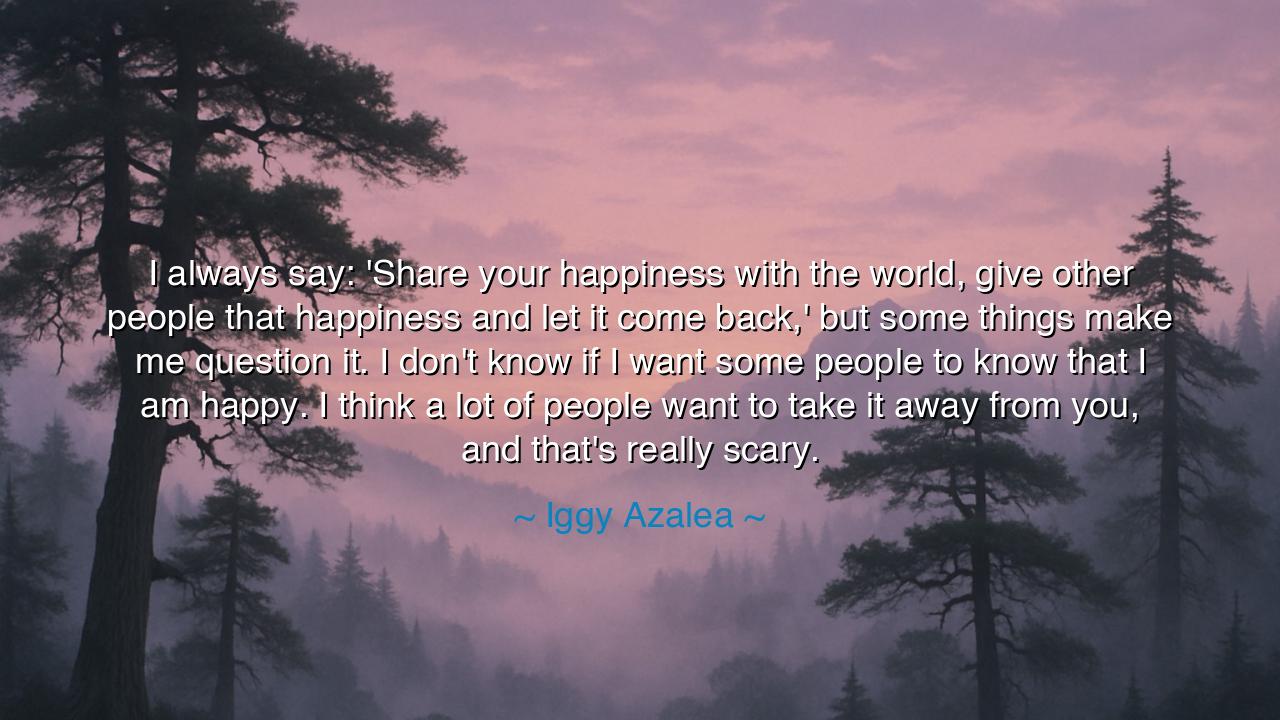
I always say: 'Share your happiness with the world, give other
I always say: 'Share your happiness with the world, give other people that happiness and let it come back,' but some things make me question it. I don't know if I want some people to know that I am happy. I think a lot of people want to take it away from you, and that's really scary.






The artist Iggy Azalea, in her haunting reflection—“I always say: ‘Share your happiness with the world, give other people that happiness and let it come back,’ but some things make me question it. I don’t know if I want some people to know that I am happy. I think a lot of people want to take it away from you, and that’s really scary.”—speaks of a truth that has echoed through the hearts of humanity since the dawn of envy and joy. In her words lies a paradox as old as existence: the yearning to share one’s light, and the fear that others may seek to extinguish it.
In every age, the wise have warned of this duality. Happiness, when pure and radiant, attracts both love and shadow. Just as a flame draws warmth to the weary but also moths to their doom, joy shines in a world that sometimes resents what it cannot possess. To share happiness is noble, for joy multiplies when given; yet to protect it is wise, for not all hearts receive light with gratitude. Thus, Iggy’s confession reveals not selfishness, but wisdom born of wounds—the realization that even light must sometimes guard itself from the darkness.
The ancients, too, wrestled with this dilemma. The Stoic philosophers of Greece and Rome taught that inner joy, or eudaimonia, must be rooted in the soul, not in the praise of others. Marcus Aurelius, emperor and sage, wrote: “The happiness of your life depends upon the quality of your thoughts.” He shared kindness with his people, yet never flaunted joy before those consumed by jealousy. For he understood what Iggy laments—that to parade one’s serenity before bitter hearts is to invite the tempest. The wise learn to balance generosity with discernment, to know when joy should be offered like sunlight, and when it should be sheltered like a sacred flame.
History bears many examples of those whose happiness invited the envy of the world. Consider Princess Diana, whose radiant compassion and laughter drew millions to love her—and yet, that same brightness ignited jealousy and intrusion so fierce it destroyed her peace. She longed to share her joy with others, to heal through love, but she learned too late that some are drawn not to the light for warmth, but to claim it as their own. Her story is the tragedy of one who shared too openly with those unready to receive tenderness without taking it.
And yet, we must not mistake caution for cynicism. To fear the theft of joy should not make us misers of it. True happiness, when anchored in humility and wisdom, cannot be stolen. It may be bruised by cruelty or shadowed by envy, but it endures like a star that shines even through the storm. What Iggy expresses is the ache of awakening—the recognition that to be happy in public is an act of vulnerability. To protect one’s spirit, one must learn the sacred art of guarded joy: to give freely without casting pearls before those who would trample them.
Let this be a teaching for the generations: share, but discern. The world is vast, and not all who smile wish you well. Offer your happiness to those who cherish goodness, who rejoice in your rising rather than resent it. But keep a secret chamber within your soul—a place where your quiet joy is untouched by applause or envy. There, your happiness will not depend on others’ eyes, but on your own peace with the divine rhythm of your life.
So, the lesson of this quote is both tender and fierce: guard your light, yet do not dim it. Like the sun, shine without explanation, but know when to retreat behind clouds to rest. Speak your joy when hearts around you are open, and keep silence when you sense the cold wind of malice. In this way, you will live wisely and freely—sharing your happiness as a blessing, not a vulnerability.
And as the ancients might say: let your joy be like a well of clear water—those who come thirsty in sincerity may drink, but do not let the envious stir its depths with dirty hands. For joy, once made sacred through discernment, becomes eternal. It is no longer the world’s to take; it becomes your own—unyielding, unbreakable, and infinitely yours.






AAdministratorAdministrator
Welcome, honored guests. Please leave a comment, we will respond soon